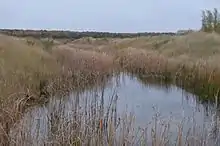| Site of Special Scientific Interest | |
 | |
| Location | Cambridgeshire |
|---|---|
| Grid reference | TL 162 941[1] |
| Interest | Biological |
| Area | 145.8 hectares[1] |
| Notification | 2004[1] |
| Location map | Magic Map |
Orton Pit is a 145.8-hectare (360-acre) biological Site of Special Scientific Interest on the southern outskirts of Peterborough in Cambridgeshire.[1][2] It is also a Special Area of Conservation[3]
This extensive area of disused brick clay workings has the largest known population in Britain of great crested newts. There are ten species of stonewort, including chara canescens, which was previously thought to be extinct in Britain, and four other nationally rare species. The habitats are diverse, with ponds, scrub and rough grassland. [4]
The site is private land with no public access, apart from a small wood in the north-east corner, north of Guelder Road and Ewood Drive.
References
- 1 2 3 4 "Designated Sites View: Orton Pit". Sites of Special Scientific Interest. Natural England. Retrieved 31 October 2016.
- ↑ "Map of Orton Pit". Sites of Special Scientific Interest. Natural England. Retrieved 31 October 2016.
- ↑ "Orton Pit". Joint Nature Conservation Committee. Retrieved 31 October 2016.
- ↑ "Orton Pit citation" (PDF). Sites of Special Scientific Interest. Natural England. Retrieved 31 October 2016.
Wikimedia Commons has media related to Orton Pit.
This article is issued from Wikipedia. The text is licensed under Creative Commons - Attribution - Sharealike. Additional terms may apply for the media files.